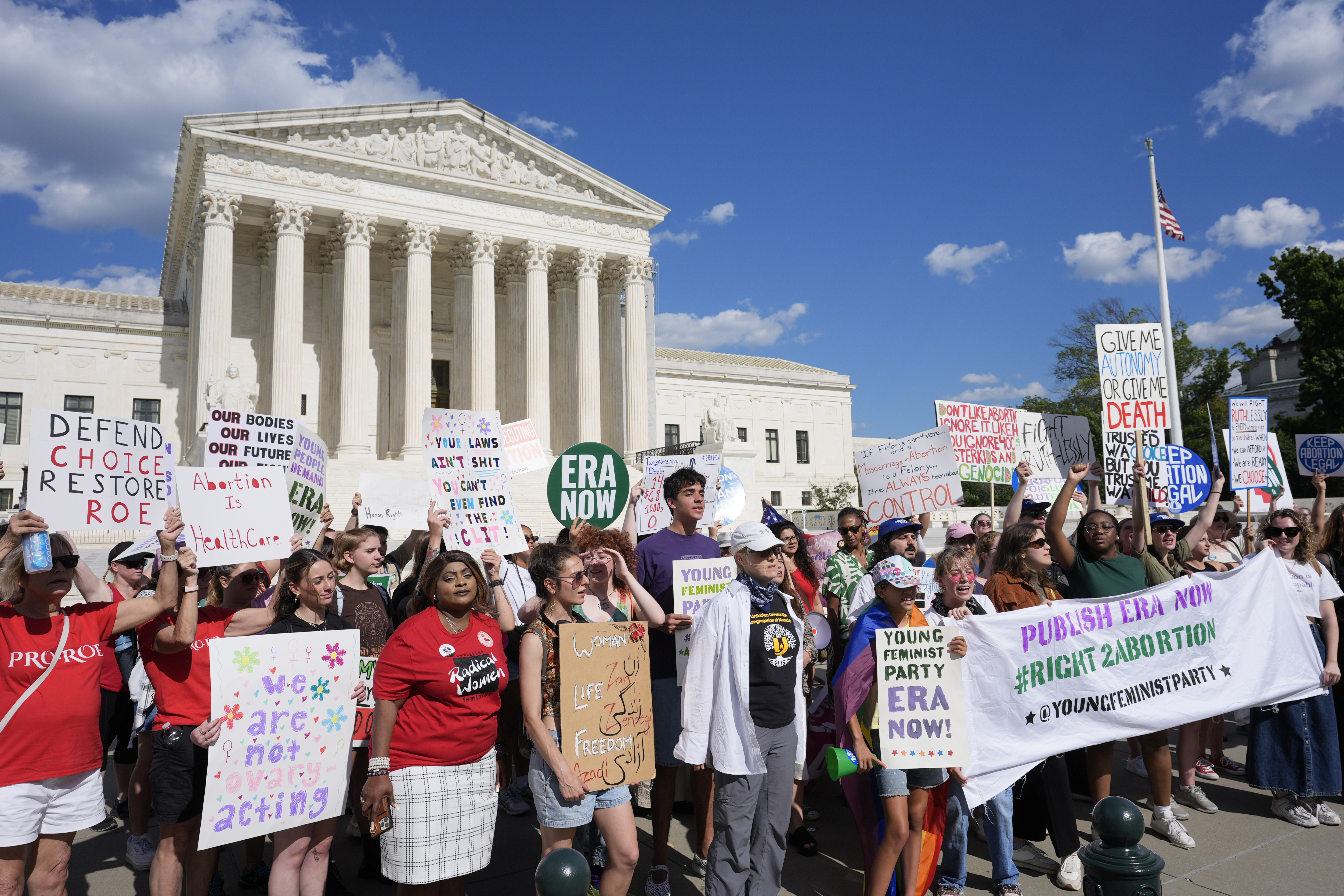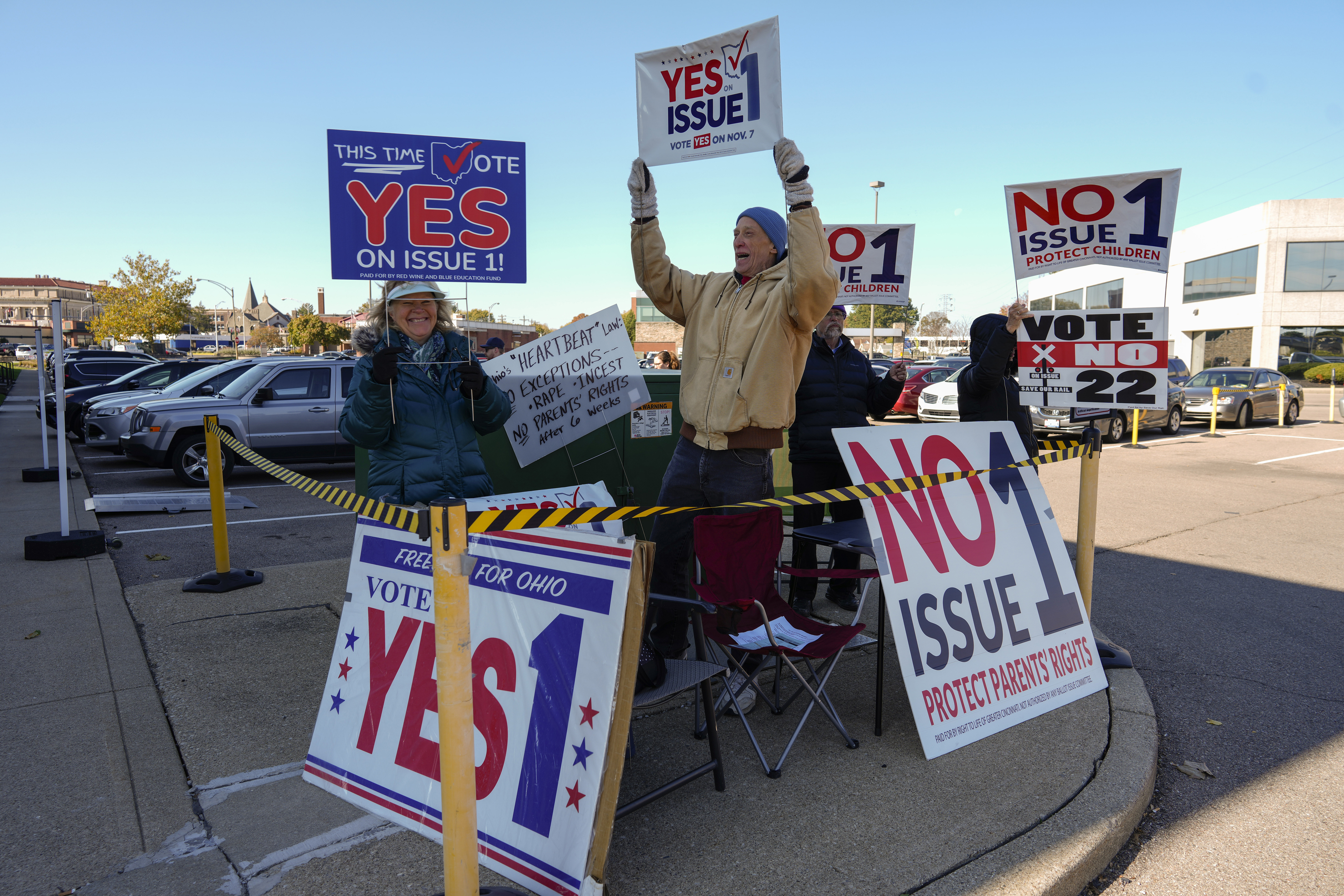The Supreme Court cleared the way Thursday for Idaho hospitals to provide emergency abortions for now in a procedural ruling that left key questions unanswered and could mean the issue ends up before the conservative-majority court again soon.
The ruling came after a day an opinion was briefly posted on the court's website accidentally and quickly taken down, but not before it was obtained by Bloomberg.
The final opinion appears largely similar to the draft released early. It reverses the court's earlier order that had allowed an Idaho abortion ban to go into effect, even in medical emergencies.
It does not resolve the issues at the heart of the case, meaning the same justices who voted to overturn the constitutional right to abortion could soon be again considering when doctors can provide abortion in medical emergencies.
The Justice Department brought the case against Idaho over its abortion law, which only allows a woman to get an abortion when her life — not her health — is at risk. The state law has raised questions about when a doctor is able to provide the stabilizing treatment that federal law requires.
The federal law, called the Emergency Medical Treatment and Active Labor Act, or EMTALA, requires doctors to stabilize or treat any patient who shows up at an emergency room.
Doctors in Idaho said that the law wasn't clear on when they could provide abortions in emergencies, forcing them to airlift pregnant women to other states for emergency care on several occasions since the high court had allowed the ban to go into effect in January.
The justices found that the court should not have gotten involved in the case so quickly, and a 6-3 majority reinstated a lower court order that had allowed hospitals in the state to perform emergency abortions to protect a pregnant patient’s health.
The contours of the issue have changed in the months since the court decided to take up the case, Justice Amy Coney Barrett wrote in a concurrence joined by Chief Justice John Roberts and Justice Brett Kavanaugh.
“I am now convinced that these cases are no longer appropriate for early resolution,” Barrett wrote, pointing to revisions Idaho made to its abortion ban and the Biden administration making clear that its arguments were aimed at rare cases.
Feeling out of the loop? We'll catch you up on the Chicago news you need to know. Sign up for the weekly> Chicago Catch-Up newsletter.
I
Justice Ketanji Brown Jackson said the court should decide now, arguing the earlier order meant Idaho doctors were forced to watch as patients suffered or airlifted out of state for care.
“We had ample time to consider this issue," she said, underscoring her views by reading a summary of her opinion aloud in the courtroom. “Not doing anything is problematic for several reasons."
"Today's decision is not a victory for pregnant patients in Idaho. It is delay," Jackson added.
Conservative Justice Samuel Alito, who authored the decision overturning Roe v. Wade, also disagreed with the decision to dismiss the case now. Joined by Justice Neil Gorsuch and Clarence Thomas, he suggested the court should side with Idaho. Federal health care law “conclusively shows that it does not require hospitals to perform abortions," he wrote.
Democratic President Joe Biden said the court's order ensures that Idaho women can get the care they need while the case continues to play out.
“Doctors should be able to practice medicine. Patients should be able to get the care they need,” he said.
A new poll from The Associated Press-NORC Center for Public Affairs Research found that about 7 in 10 U.S. adults favor protecting access to abortions for patients who are experiencing miscarriages or other pregnancy-related emergencies.
Abortion-rights groups said the opinion would bring temporary relief, but leave “devastating” uncertainty about the larger picture. “This fight is far from over,” said Alexa Kolbi-Molinas, deputy director of the ACLU Reproductive Freedom Project.
Idaho is one of 14 states that now ban abortion at all stages of pregnancy with very limited exceptions.
The case marks the first time the Supreme Court has considered the implications of a state ban since overturning the nationwide right to abortion.
The high court had already allowed the state ban to go into effect, even in medical emergencies. The Biden administration argued that federal law overrides the state in rare emergency cases where a pregnant patient’s health is at serious risk.
The state argued that its strict abortion ban does allow abortions to save a woman’s life, and doesn’t need to expand exceptions for health risks.
But across the country, complaints that pregnant women have been turned away from emergency rooms care have spiked since Roe was overturned.
During oral arguments earlier this year, the court's liberal justices detailed cases of pregnant women hemorrhaging or having to undergo hysterectomies after abortion care was denied or delayed in states with bans.
“Within these rare cases, there’s a significant number where the woman’s life is not in peril, but she’s going to lose her reproductive organs. She’s going to lose the ability to have children in the future unless an abortion takes place,” said Justice Elena Kagan.
Conservative Justice Amy Coney Barrett, meanwhile, said she was “kind of shocked” that an attorney for Idaho appeared to hedge when asked whether the state would allow abortions in cases like those. Attorney Joshua N. Turner responded that doctors can use their “good faith” medical judgment under Idaho’s life-saving exception, but Barrett continued to press: “What if the prosecutor thinks differently?”
Turner acknowledged that a doctor could face a criminal case in that situation. Performing an abortion outside of limited exceptions in Idaho is a felony punishable by up to five years in prison.
Doctors have said Idaho’s abortion ban has already affected emergency care. More women whose conditions are typically treated with abortions must now be flown out of state for care, since doctors must wait until they are close to death to provide terminations within the bounds of state law.
Abortion opponents say doctors have mishandled maternal emergency cases, and argue the Biden administration overstates health care woes to undermine state abortion laws.



